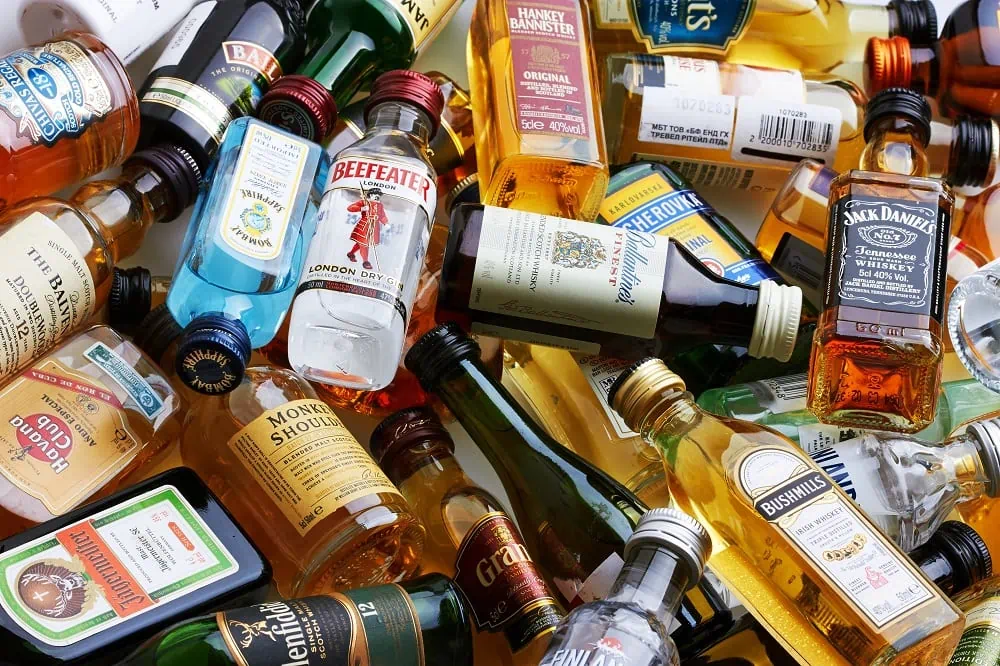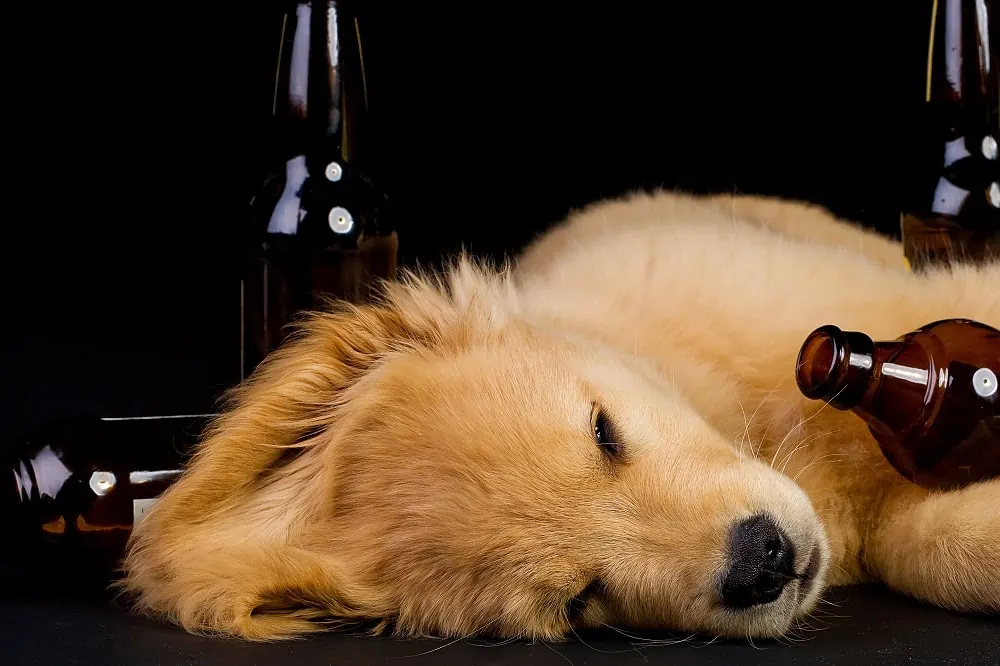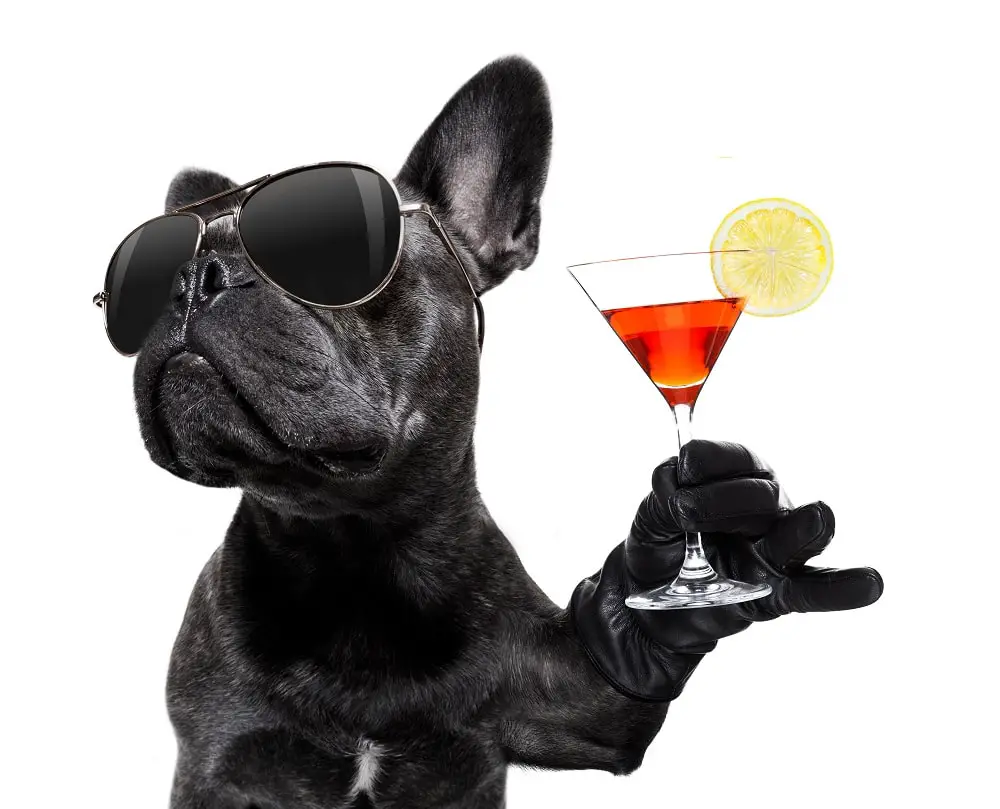Let’s paint the scene: it’s been a long day and you’re relaxing at home with a glass of wine or a nice, cold beer. You set your drink down for a moment and leave the room.
When you come back, your glass has noticeably less in it, but no one else is around except your curious dog, who’s sitting there wagging its tail. Before you start to panic, you wonder to yourself, “Can dogs even get drunk?”
So, can dogs get drunk? Yes, dogs can get drunk. In fact, alcohol is toxic to dogs, even in small amounts. Taking steps to prevent alcohol consumption, and knowing what to do if it does happen, is a key part of keeping your dog safe and healthy.
Preventing Your Dog from Drinking Alcohol
Given that alcohol is toxic to dogs, the most important step in keeping them safe is to prevent them from drinking alcohol in the first place.
The first and most obvious way to prevent it is to never willingly give your dog alcohol. While it may seem fun or funny to share your drink with your dog, the risk is not worth it.
Always keep alcoholic beverages out of your dog’s reach, especially if you’re leaving the room even for a moment.
Many curious dogs will find it too hard to resist, and you’ll have a problem on your hands pretty quickly.
Another important step is to avoid sharing non-alcoholic drinks with your dog. Even aside from the hygiene issues, dogs learn by repetition, and if they are treated to a gulp of water out of your glass time and time again, they’re going to think it’s okay to drink any other drink out of your glass as well.
Once that idea is solidified in their minds, it only takes a brief moment with an unattended drink for a dangerous situation to occur.
If you’re having guests over and alcohol is on the menu, be sure to let them know to be vigilant when your dog is around. Especially if they do not have a dog themselves, your guests may not think twice about placing a drink down on an end table, or even on the floor, where your dog would have easy access to it.
If an alcoholic drink is spilled, clean it up immediately and keep your dog away from it. If someone else is there, have them hold your dog gently while you clean up the mess, so you can focus on cleaning thoroughly without having to wrestle your dog in the meantime.
When it comes to dogs’ having access to alcohol, one thing many people don’t think of is all of the products that have alcohol in them that we don’t drink.
Common household items like hand sanitizer, cologne and perfume, and mouthwash often contain alcohol. While we would never think of drinking these products, your dog doesn’t know the difference between a drinkable and non-drinkable liquid, especially if it smells good.
Be sure to clean up any spills quickly and thoroughly. Many of the same tips for cleaning alcohol can be applied from this article.
Effects of Different Types of Alcohol

If your dog has consumed alcohol, the first thing to do is to take note of what type of alcohol it drank. Different drinks will have a different amount of alcohol in them, which will inform how you proceed.
When it comes to the percentage of alcohol by volume, there is a huge variance between types of alcoholic drinks. On the lowest end are light beers, which will generally have between three and four percent alcohol. Regular and craft beers can have anywhere from five to eight percent alcohol.
Moving up the scale is wine, where the amount of alcohol generally falls in the 11-13 percent range.
When you get to liquor, the amount of alcohol can really get high, with 28% being on the low end of the spectrum, and some grain alcohols having a shocking 95% alcohol by volume.
In addition to the alcohol content, other ingredients in alcoholic beverages may come into play as well. Beer is made with hops, which is toxic to dogs, causing a quick rise in body temperature called malignant hyperthermia.
A dog’s temperature is usually around 102°F can rise as high as 108°F. Malignant hyperthermia can cause permanent organ damage and even death (source).
Wine is made from grapes, and though grapes can be toxic to dogs, there is no research to suggest the wine is any more harmful to your dog than other types of alcohol. But any amount of alcohol is bad for your dog, grape-based or not.
The good news is that the stronger the alcohol content, the less likely your dog is to drink it in the first place. Many dogs will find the taste and smell of alcohol unpleasant, so they’re more likely to drink a light beer that’s left unattended than a martini.
Since the alcohol content is lower in the light beer, it’s less likely to cause serious problems (source).
Related Article: Can dogs eat pumpkin seeds? Is it dangerous for your dog?
Symptoms of Alcohol Poisoning in Dogs
If you’ve ever been at a party and seen a person have a few too many, then you’re already familiar with the symptoms of alcohol poisoning. The symptoms in dogs align pretty closely with those in humans.
The first symptom you’re likely to notice is lethargy and listlessness. Your usually perky pup will be laying around, moving slowly, and staggering when they walk.
They may not come when you call them, and may not even want to go outside when you offer.
Vomiting will likely follow as its body attempts to reject the toxic alcohol. They may also lose their ability to control urination, and your previously perfectly housetrained dog may go inside. Diarrhea can be expected as well, even as the other symptoms start to subside.
Alcohol can cause a rise in your dog’s body temperature, which can be dangerous and lead to organ damage. It may be hard to know if your dog has a fever (when’s the last time you tried to take its temperature?), but excessive panting is usually a good indicator.
In severe cases of alcohol poisoning, your dog may begin to have muscle tremors, seizures, slow, shallow breathing, or a loss of consciousness (source).
**How about spoiled meat? Find out the effects of feeding spoiled meat to your dog here!**
What to Do If Your Dog Drinks Alcohol

If your best attempts at prevention fail and your dog does drink alcohol, the first step is to assess how much they drank and what type of alcohol it was.
If it was only a small sip of something low in alcohol content, you may be safe just waiting and seeing if any symptoms arise.
The type of dog is also going to factor in your reaction. As we all know, dogs come in all shapes and sizes. If you have a small dog, like a Yorkshire terrier or a chihuahua, even a sip of alcohol could have dangerous results.
But if your dog is a large breed like a mastiff or a German shepherd, it would take quite a bit more to enter the danger zone. Of course, most dogs fall in between these two ends of the spectrum, so use your best judgment and monitor your dog closely (source).
If you are unsure of how much they drank, or if they begin to show symptoms of being drunk, your safest bet is to take them to the vet. It’s usually a good idea to call the vet first to inform them of what has happened so they can be ready for your arrival and can treat your dog as quickly as possible.
Unfortunately, the times we’re most likely to be drinking alcohol don’t usually line up with vet hours, so you should call your closest emergency vet clinic for advice on how to proceed. They may want you to bring the dog in to have its stomach pumped.
If your vet advises you to keep an eye on symptoms before bringing them in, be sure to monitor your dog closely for several hours.
If the only symptoms they’re showing are staggering or urinating uncontrollably, it may be safe to wait it out. But if any of the more severe symptoms present themselves, such as tremors, seizures, or loss of consciousness, take your dog to the vet immediately (source).
Find out if dogs can drink beer in this short video below:
Final Thoughts
While the best protection for your dog is prevention, sometimes accidents happen and they may end up drinking alcohol.
The important thing is to assess the situation by determining how much they consumed and the alcohol content of the drink. Depending on this information, it may be necessary to immediately take your dog to the vet or an emergency vet clinic.
If the amount was small, your vet may advise you to wait and watch them carefully for signs of alcohol poisoning.
Always remember that your most important job as a pet owner is to keep your four-legged friend safe and healthy.
One key aspect of that duty is to never give them alcohol, and do everything you can to prevent them from drinking it on their own.


0 Comments